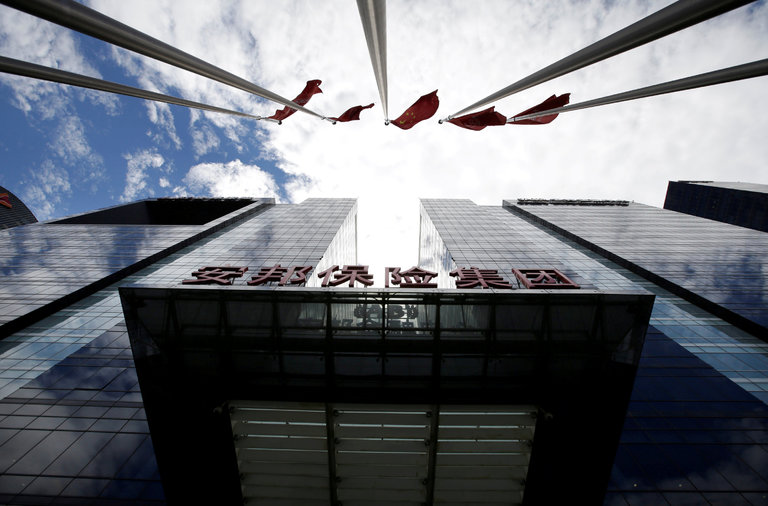Media Report

- The New York Times reports: "Let the West worry about so-called black swans, rare and unexpected events that can upset financial markets. China is more concerned about "gray rhinos" — large and visible problems in the economy that are ignored until they start moving fast. The rhinos are a herd of Chinese tycoons who have used a combination of political connections and raw ambition to create sprawling global conglomerates. Companies like Anbang Insurance Group, Fosun International, HNA Group and Dalian Wanda Group have feasted on cheap debt provided by state banks, spending lavishly to build their empires. Such players are now so big, so complex, so indebted and so enmeshed in the economy that the Chinese government is abruptly bringing them to heel. President Xi Jinping recently warned that financial stability is crucial to national security, while the official newspaper of the Communist Party pointed to the dangers of a 'gray rhinoceros,' without naming specific companies. Chinese regulators have become increasingly concerned that some of the biggest conglomerates have borrowed so much that they could pose risks to the financial system. Banking officials are ramping up scrutiny of companies' balance sheets. The turnabout for the first generation of post-Mao Chinese capitalists, once seen as exemplars of the country's ingenuity and economic prowess, has been swift."
- The Washington Post comments: "There has been no shortage of headlines proclaiming China's growing clout in a 'new world order' in recent months. This speculation resurfaced after the July G-20 summit, at which the United States reconfirmed its withdrawal from the Paris climate accord, and the May 2017 summit of the Belt and Road, China's $1 trillion global plan for infrastructure projects and trade deals connecting Africa, Asia and Europe. This project aims to span 68 countries, linking China's people and markets to regions far beyond its borders. The Belt and Road, announced by Chinese President Xi Jinping in 2013, has conjured images of a colonial China pillaging natural resources and enabling dictators across Africa in exchange for U.N. votes. But our research suggests that there are other drivers behind China's foreign policy. Our data at the China-Africa Research Initiative — collected from official websites of central banks, ministries of finance and Chinese contractors, and cross-checked through interviews with Chinese and African officials — reveals that China's economic needs, rather than any set political agenda, drives Beijing's activities in developing countries."
- CNBC reports: "Vietnam stopped a company from exploring for energy in contested waters of the South China Sea after taking threats from Beijing, the BBC reported early on Monday. Talisman-Vietnam, a subsidiary of Spanish energy firm Repsol, commenced gas-drilling operations in an area about 400 kilometers off Vietnam's coast earlier this month, but Hanoi has since ordered Repsol to leave the zone, the BBC said, citing an unnamed source. Last week, Beijing warned Hanoi that it would attack Vietnamese bases in the Spratly Islands if drilling continued, the BBC continued... Hanoi's compliance with Chinese threats, if true, could spell bad news for Manila and Jakarta, which recently announced bold moves in the tension-ridden region. This month, the Philippines suggested it could resume oil and gas drilling in the Reed Bank after a three-year suspension. Meanwhile, Indonesia has renamed the northern side of its exclusive economic zone in the South China sea and could soon use its navy to protect resource exploration."
Calendar
- 2017-07-23 Op-Ed: China will cooperate to narrow US trade deficit
- 2017-07-21 China's navy expands reach: Ships in Baltic for drills with Russia
- 2017-07-20 Trade talks fizzle as China rebuffs key Trump team demand
- 2017-07-19 U.S., China talks seen offering small-scale market access deals
- 2017-07-18 How to persuade China to abandon North Korea
- 2017-07-17 China upset about 'negative' Taiwain content in U.W. defense bill
- 2017-07-16 US-China Trade Talks Sputtering at 100-Day Deadline
- 2017-07-14 China Changes How It Calculates GDP for First Time Since 2002
- 2017-07-13 China June exports, imports higher than expected as global demand holds strong
- 2017-07-12 China sends troops to Djibouti, establishes first overseas military base
News
- The New York Times In China, Herd of 'Gray Rhinos' Threatens Economy
- CNBC China reportedly threatens Vietnam into ending energy exploration in South China Sea
- Reuters China warns India not to harbor illusions in border stand-off
- ABC News China's state media warns of further warship deployment to Western waters
- The Seattle Times China hopes construction of Thai railway can start quickly
- The Washington Post How to make $100,000 a month in China live-streaming your life
- CNBC China will cooperate to narrow US trade defecit
- Quartz China's female soldiers fly fighter jets, but its state media would rather focus on their dancing skills
- CNBC In China, Big Tech Confronts New Walls
- USA Today American student arrested in China has been freed
- Reuters China's debt specter could haunt Fed's policy meetings
- Quartz Visiting China? Don't expect to find a swanky hotel to help you escape the Great Firewall
- Barrons China Brokerage Stocks: It's Time to Buy
Commentary
- The Washington Post China's 'Belt and Road' opens up new business in Africa -- for both the U.S. and China
- The National Interest Japan and South Korea Want More Military Firepower (Thanks to China and North Korea)
- The National Interest How Japan Could Sink China's Navy in a War: Ramjet Missiles
- Foreign Policy How Badly Is China's Great Firewall Hurting the Country's Economy?
- Business Insider China has a lot of problems -- but a revolution isn't one of them
- LiveMint China's conduct and the logic of power
- Lawfare Qatar, China, Georgia and Elon Musk
